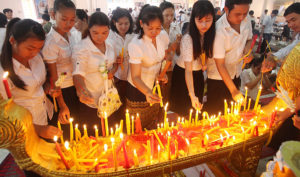 I attended elementary school and high school in Amherst, Massachusetts where there is a large Cambodian community and every April we would have a school celebration for Cambodian New Year where students would perform traditional Cambodian dances. My favorite was always the Monkey Dance in which the participants would fly acrobatically through the air imitating monkeys. We would also eat Cambodian foods and listen to Khmer folktales. Years later, when I was working as a 5th grade classroom assistant and tutor, we visited a local Buddhist temple and gave food offerings to the monks and learned about Cambodian Buddhist traditions. Despite my enjoyment of Cambodian New Year all throughout my childhood, I have only recently learned about another important Khmer holiday: P’chum Ben, The Festival of the Dead. Today I would like to discuss this fascinating annual observance in honor of the ancestors which shares so much in common with other festivals of the dead around the world yet is also undeniably unique.
I attended elementary school and high school in Amherst, Massachusetts where there is a large Cambodian community and every April we would have a school celebration for Cambodian New Year where students would perform traditional Cambodian dances. My favorite was always the Monkey Dance in which the participants would fly acrobatically through the air imitating monkeys. We would also eat Cambodian foods and listen to Khmer folktales. Years later, when I was working as a 5th grade classroom assistant and tutor, we visited a local Buddhist temple and gave food offerings to the monks and learned about Cambodian Buddhist traditions. Despite my enjoyment of Cambodian New Year all throughout my childhood, I have only recently learned about another important Khmer holiday: P’chum Ben, The Festival of the Dead. Today I would like to discuss this fascinating annual observance in honor of the ancestors which shares so much in common with other festivals of the dead around the world yet is also undeniably unique.
P’chum Ben marks the end of a fifteen day period known as Pak Ben which falls during the tenth month of the lunar calendar which coincides with September and early October according to the Western calendar. During this period, Cambodian Buddhists bring offerings of food to monks at local temples. Sweets and fruits, especially banana leaves stuffed with sweet rice, are the preferred offerings. Devout Buddhists ornately arrange these offerings on platters often with flowers and other decorations and bring them to the local temple. On P’chum Ben, monks give speeches and recite ancient chants in the sacred Pali language all night and families offer prayers for their departed loved ones going back several generations. There is also a carnival like atmosphere on P’chum Ben with elaborate family feasts, music and a spirit of communal celebration in towns and cities across Cambodia and in Khmer communities around the world.
P’chum Ben shares many similarities with other festivals throughout the world that honor the dead such as the Chinese Hungry Ghosts Festival, the Japanese Obon, the Haitian Fet Ghede, the Mexican Día de los Muertos and the Pagan observance of Samhain. All of these observances are times to honor the dead and all share the custom of making offerings and reciting prayers to ensure that loved ones have a happy and peaceful afterlife. Much in line with the Chinese and Mexican traditions, there is a belief that during P’chum Ben, the gates of the afterlife open and spirits are allowed to return to Earth. P’chum Ben shares with the Hungry Ghost festival the tradition of making offerings to ghosts who have nobody to pray for them and who therefore might be angry or distraught. In Cambodia, there exists the custom on mixing rice with sesame seeds and sprinkling it in front of temples as an offering to Hungry Ghosts and wandering spirits. In Khmer Buddhist theology, it is not the offering themselves that are believed to be consumed by the dead, but rather it is the act of presenting these offerings to monks in an act of charity and piety that creates merit that helps the dead. This concept is unique to the celebration of P’chum Ben and differs from Chinese folk religion in which the offerings are believed to benefit the dead directly, although in some parts of Cambodia similar beliefs exist. In addition to the solemn rituals carried out in pagodas across Cambodia, P’chum Ben also shares the carnival-like atmosphere typical of the Mexican Day of the Dead with music, family gatherings and outdoor celebrations.
This year P’chum Ben begins on September 30th and lasts until October 2nd. If you’d like to honor your ancestors during this time you could make food offerings at home as well as light candles for them. In Cambodia, small red and yellow candles are traditionally used. If you have a Buddhist temple nearby, you might consider making a visit and, in the true spirit of P’chum Ben, making a gift of food to the monks or even a donation of money to the charity of your choice in the name of your ancestors, a good deep from which you and your ancestors will benefit tremendously. The most important lesson to learn from P’chum Ben and indeed from all festivals that honor the dead is that life, in one form or another, is eternal and we are all connected to the spirit world through our loved ones that have crossed over and it’s important to take some time now and then to remember and honor them.
I hope you have enjoyed this post and as always I wish you peace, happiness and abundant blessings!